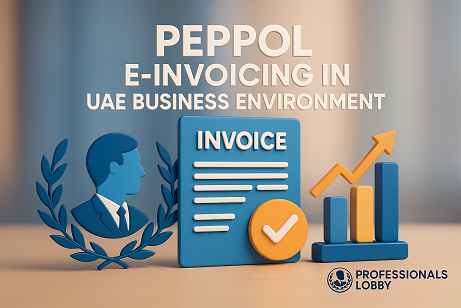As the UAE accelerates its journey towards digital transformation and mandatory e-invoicing, businesses must prepare for the upcoming adoption of Peppol (Pan-European Public Procurement Online) by 2026. While Peppol began as a European initiative, it has now evolved into a global framework for electronic invoicing and document exchange, helping governments and companies standardize cross-border transactions.
For UAE companies—whether SMEs, trading firms, logistics providers, or large enterprises—understanding Peppol is not optional. It will soon become a compliance requirement, much like VAT in 2018 and the upcoming phased e-invoicing mandate by the Federal Tax Authority (FTA).
In this article, we'll break down what Peppol is, how it impacts UAE businesses, and the steps you should take now to be ready by 2026.
What is Peppol?
Peppol is a secure international network that enables companies, suppliers, and governments to exchange e-invoices, purchase orders, and business documents in a standardized format.
Instead of every business using different systems and formats, Peppol provides a single, interoperable standard. Businesses only need to connect once to the Peppol network to communicate with any other participant worldwide.
Key features of Peppol include:
- ✅ Global standardization of e-invoices and procurement documents.
- ✅ Cross-border interoperability (ideal for import/export-heavy UAE market).
- ✅ Reduced fraud and errors through secure document exchange.
- ✅ Full compliance with government tax authorities and procurement systems.
Why is Peppol Coming to the UAE?
The UAE government is pushing for a smart economy under UAE Vision 2031 and paperless transformation initiatives. Just as Saudi Arabia has moved aggressively with mandatory e-invoicing (FATOORA), the UAE is expected to integrate Peppol into its FTA-approved e-invoicing framework by 2026.
This shift ensures:
- Alignment with OECD and global tax compliance standards.
- Easier cross-border trade with EU and Asia-Pacific countries already on Peppol.
- Streamlined public sector procurement for UAE government contracts.
- Increased tax transparency and anti-fraud protection.
What UAE Businesses Need to Do
Whether you run a small trading shop, a logistics company, or a multinational in Dubai or Abu Dhabi, preparation is key.
1. Understand the Timeline
- 2024–2025: Awareness and pilot phases (FTA-approved solutions start integrating Peppol).
- 2026: Likely mandatory adoption for VAT-registered businesses in phases.
2. Choose the Right Technology Partner
- Select an FTA-approved e-invoicing solution with Peppol integration.
- Ensure it supports Arabic & English, mobile access, and cloud-based scalability.
- Verify features like barcode, receipt printing, VAT reporting, email/WhatsApp invoice sharing.
3. Train Your Teams
Your finance and procurement teams need to be familiar with Peppol BIS (Business Interoperability Specifications) formats. This avoids compliance errors and penalties.
4. Integrate with ERP or Accounting Software
If you already use an ERP like SAP, Oracle, Odoo, or Zoho, check whether Peppol connectors are available. For SMEs, lighter tools such as Vyapar, TallyPrime, or Zoho Books may release Peppol-ready updates.
Peppol Readiness Checklist for UAE Businesses
| Business Size | Immediate Actions | Technology Requirements | Deadline |
|---|---|---|---|
| SMEs (<50 employees) | Research Peppol-ready accounting software | Cloud-based solution with FTA approval | Q4 2025 |
| Mid-market (50-200 employees) | Assess current ERP Peppol compatibility | ERP integration or middleware solution | Q2 2025 |
| Enterprise (200+ employees) | Develop comprehensive implementation plan | Direct Peppol access point or service provider | Q4 2024 |
| Government Suppliers | Immediate Peppol implementation | FTA-approved solution with Peppol certification | Already applicable |
Benefits of Peppol for UAE Businesses
Adopting Peppol is more than just FTA compliance—it brings significant business value:
Faster Payments
Accelerated payment cycles from clients and government entities
Cost Reduction
Eliminate paper invoicing and manual reconciliation costs
Global Trade
Simplified international trade with standardized formats
Enhanced Security
Reduced fraud risk through secure transaction protocols
Competitive Advantage
Early adopters gain market differentiation
Better Analytics
Improved financial insights through standardized data
The AI Advantage in Peppol Adoption
With AI-powered invoice processing, UAE businesses can go beyond compliance:
- AI can auto-match invoices to purchase orders.
- Smart anomaly detection prevents duplicate or fraudulent invoices.
- AI-driven analytics provide real-time VAT reporting and cashflow insights.
- Businesses can use chatbots and AI assistants for supplier queries and finance workflows.
Integrating AI with Peppol means UAE businesses won't just comply—they'll optimize operations and gain long-term efficiency.
Case Study: Dubai Trading Company Implements Peppol-ready Solution
A mid-sized trading company in Dubai implemented a Peppol-ready e-invoicing system in 2024. Results after 6 months:
- 68% reduction in invoice processing costs
- Payment cycles shortened from 45 to 22 days on average
- Zero compliance issues with FTA requirements
- Seamless invoicing with European partners already on Peppol
Final Thoughts
By 2026, Peppol will reshape how UAE companies handle invoicing, procurement, and compliance. Early preparation is the smartest move.
Whether you're an SME in Sharjah, a logistics firm in Dubai, or a multinational in Abu Dhabi, adopting Peppol-ready, AI-enabled invoicing solutions will ensure you remain competitive, compliant, and future-proof.
Need Help with Peppol Preparation?
At Professionals Lobby, we guide UAE businesses through ERP, AI, and digital transformation journeys—including Peppol readiness assessments and solution recommendations.
Get Peppol Readiness Assessment

